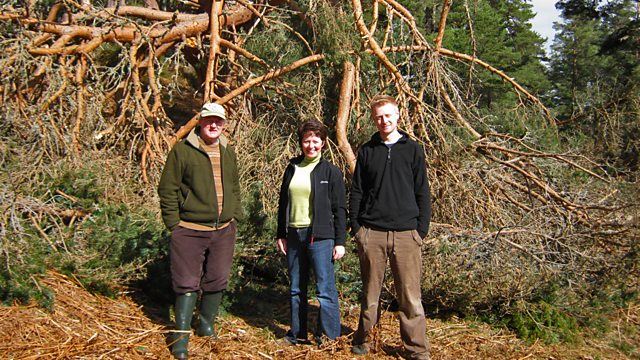Scotland's Coldest Winter
Helen Mark visits Scotland to find out how the landscape and wildlife have been affected by the coldest winter for decades.
Helen Mark is in Scotland to find out how the wildlife and landscape have been affected by the longest and coldest winter in decades. Many species of birds have suffered and there has been concern over deer which have moved to lower ground in search of food and, in some places, have literally been starving to death . The long term effect could be devastating and recovery could take years. Farmers have struggled to reach livestock and those that have managed to do so find themselves facing huge bills for extra feed. And in forests many trees have either died or lost branches when succumbing to the heavy weight of snow on their boughs.
But is it all bad news? Reports of a midge free summer after the icy weather caused the hibernating insects to freeze to death in the ground have been greeted with delight by tourists and locals alike. And in ancient forests such as the Abernethy Nature Reserve which works to create deadwood, this winter has been one of their best with naturally created deadwood serving as food for bugs which, in turn provide a hearty meal for birds. So, has it been an exceptionally bad winter......or have we simply forgotten what a 'real' winter is like?
Helen journeys through the Highlands of Scotland to find out about the impact of the freezing temperatures and deep snow, which lay on the ground for almost 3 months. She begins at the Aigas Field Centre in Beauly, home of writer, Sir John Lister Kaye. For years, John has closely observed the changes in nature from his regular walks round a loch near his home and feels that this winter has hit the wildlife in the area pretty hard. From Beauly, Helen travels to the Black Isle to meet up with Dan Tomes of the RSPB to hear how the bird population has coped with the arctic conditions, particularly the barn owl which relies so heavily on the mice and voles which would have been buried under thick snow.
But not all is doom and gloom. Wardens at the Abernethy Nature Reserve in the Cairngorm National Park, part of which is ancient Caledonian woodland, work to create deadwood which provides food for bugs and, in turn, the birds that feed on them. Helen is shown how this is done, and lends a hand by helping to winch a tree to the ground. This winter, with heavy snow on the boughs of ancient trees, the forest came to life with the gunfire sound of branches breaking and snapping naturally. For Desmond Dugan and Ian Perks at Abernethy, this has been a great winter!
But not so for farmers. Finally, Helen travels the few miles to Balliefurth Farm where she meets farmer Alastair McLennan. Alastair has struggled through the thick snow to reach his sheep which have been reliant on supplementary feed all winter and this problem will continue well into the year with the arrival so late of spring.
Producer: Helen Chetwynd.
Last on
More episodes
Previous
Broadcasts
- Sat 1 May 2010 06:07成人快手 Radio 4
- Thu 6 May 2010 15:00成人快手 Radio 4 FM
Podcast
-
![]()
Open Country
Countryside magazine featuring the people and wildlife that shape the landscape of Britain


